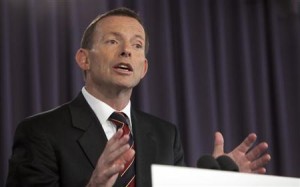
With Australia’s national elections just two weeks away, the opposition party is promising voters that it will be even nastier to refugees who try to come into Australia by boat
Opposition Leader Tony Abbott, whose conservative coalition leads Prime Minister Kevin Rudd’s ruling Labor Party in polls ahead of the September 7 ballot, said he would also block access to court appeals for up to 30,000 asylum seekers if they are denied refugee status.
“This is our country and we determine who comes here,” said Abbott in an echo of strongly nationalist border control sentiments championed by the country’s last conservative leader, John Howard, before Labor swept him from power in 2007.
According to government figures, as of last week 18,000 foreigners had arrived illegally in Australia by boat so far this year and 6,500 of them or more than one-third were Iranians—the largest single nationality among the illegals.
It is clear that both major parties see foreigners trying to force their way into Australia as so hated by the public that they are competing to propose the harshest policies.
The Australian Green Party denounces both major parties for their harsh attitude toward the boat people. But the Greens do not hold even 5 percent of the seats in parliament.
Polls show immigration to be is a major issue for millions of voters. The largest single nationality arriving by boat this year has been Iranian.
Around 15,000 asylum seekers have arrived this year, prompting Rudd in July to announce a deal to send all boat arrivals to detention in Papua New Guinea for settlement there if they are found to be refugees. They will be denied refugee status if they are found to be fleeing their homeland to seek better economic opportunities rather than because of political, ethnic or religious oppression.
Abbott has already promised to appoint a military commander to take charge of asylum issues in an operation dubbed “Sovereign Borders.” He said if he won power, the 30,000 asylum seekers in Australia would only receive temporary protection visas if they are denied refugee status.
That would mean they could be sent home in the future. Iran, however, refuses to accept Iranians being expelled by other countries. It says it will only accept Iranians who are willingly returning to Iran. At the same time, however, Iranian law says Iranian citizens can never abandon their citizenship and always remain Iranian citizens. That puts the Islamic Republic in the unique position of refusing to allow into Iran people it says have to remain Iranian citizens.
Abbott’s immigration spokesman, Scott Morrison, acknowledges that the conservative coalition’s harsh policy, criticized by the United Nations and human rights groups, could be challenged in the courts. Tough immigration laws promoted by the ruling Labor Party have already been subject to several legal setbacks in Australia.
Australia’s stance contrasts with moves by the United States to offer a pathway to citizenship for many of its 11 million illegal immigrants, although many European countries are also hardening immigration rules.
Norway, which holds elections two days after Australia, is debating a crackdown on immigration, running at about 40,000 newcomers a year in a country of 5 million, far smaller than Australia’s 23 million.
More than 45.2 million people were forcibly displaced worldwide last year, the highest number since 1994, according to the UN High Commissioner for Refugees (UNHCR).
“There is no national emergency; there is a humanitarian emergency,” Greens Senator Sarah Hanson-Young told reporters. “This is the Liberal Party led by Tony Abbott trashing Australia’s international reputation and our spirit as a nation of standing up for a fair-go.”
Opinion polls show Abbott’s conservative Liberal-National Party coalition holding a 52 percent to 48 percent lead.